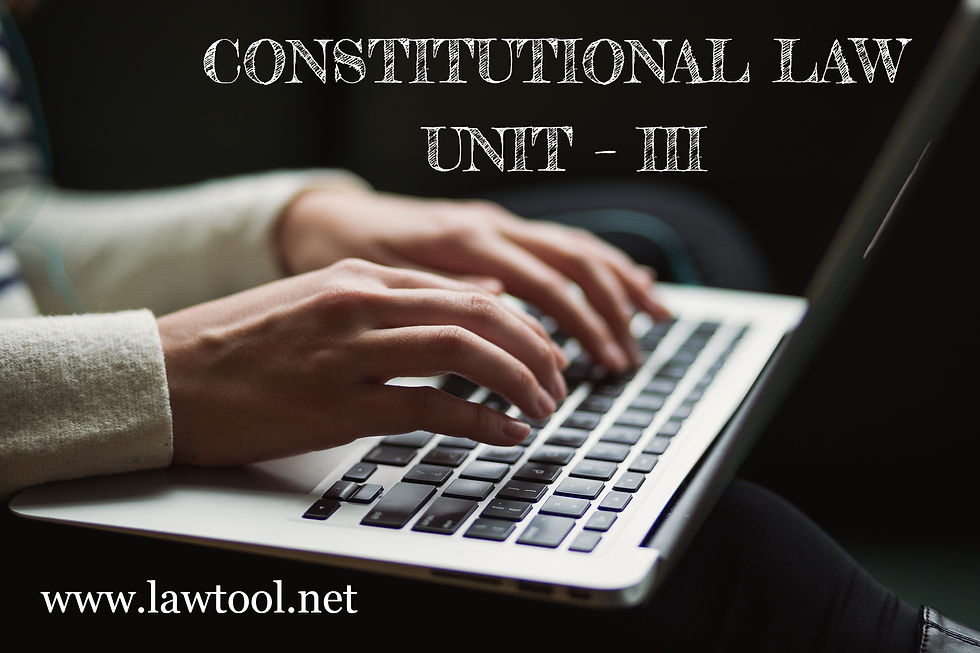The Doctrine of Severability
- www.lawtool.net

- Apr 10, 2022
- 2 min read
Updated: Apr 12, 2022
The doctrine of Severability
Article 13 of the Constitution of India reads as under:
The doctrine of Severability: Under Judicial Review, the Supreme Court and the High Courts may declare a law as void if it is against the Constitution. The question is whether the whole of the law (or Statute) is void or only that portion which is unconstitutional. To answer this, the Supreme Court has evolved the 'Doctrine of Severability'.
HINDI :- पृथक्करण का सिद्धांत
पृथक्करण का सिद्धांत: न्यायिक समीक्षा के तहत, सर्वोच्च न्यायालय और उच्च न्यायालय किसी कानून को शून्य घोषित कर सकते हैं यदि वह संविधान के विरुद्ध है। सवाल यह है कि क्या पूरा कानून (या क़ानून) शून्य है या केवल वह हिस्सा जो असंवैधानिक है। इसका उत्तर देने के लिए, सर्वोच्च न्यायालय ने ' doctrine of Severability/ पृथक्करण/विच्छेदन का सिद्धांत' विकसित किया है।जब किसी अधिनियम का कोई भाग असंवैधानिक होता है तब प्रश्न यह उठता है कि क्या उस पूरे अधिनियम को ही शून्य घोषित कर दिया जाय या केवल उसके उसी भाग को अवैध घोषित किया जाय जो, संविधान के उपबन्धों से असंगत है? ऐसे मामलों के निपटाने के लिए उच्चतम न्यायालय ने पृथक्करणीयता का सिद्धान्त प्रतिपादित किया है।
इसका मतलब यह है कि यदि किसी क़ानून में आपत्तिजनक और वैध प्रावधान भी हैं और, आपत्तिजनक को वैध प्रावधानों से अलग करना संभव है, तो केवल आपत्तिजनक प्रावधानों को ही शून्य और असंवैधानिक घोषित किया जाता है। संपूर्ण क़ानून या अधिनियम को रद्द नहीं किया जाएगा।
Important
The 'Doctrine of Severability' in Article 13 of the Constitution of India can be understood in two dimensions:
Article 13 (1) validates all Pre-Constitutional Law and, thereby, declares that all Pre-Constitutional laws in force before the commencement of the Constitution of India shall be void, if they are inconsistent with the fundamental rights.
Article 13 (2) mandates the State that it shall not make any law which takes away or abridges the fundamental rights conferred in Part III of Constitution of India and any law contraventions this clause shall be void.
Landmark Judgments
Landmark Judgments
R.M.D.C. Vs. Union of India, AIR 1957 SC 628] is considered to be one of the most important cases on the Doctrine of Severability. In this case, the Supreme Court observed that:
The doctrine of severability rests, as will presently be shown, on a presumed intention of the legislature that if a part of a statute turns out to be void, that should not affect the validity of the rest of it, and that that intention is to be ascertained from the terms of the statute. It is the true nature of the subject-matter of the legislation that is the determining factor, and while a classification made in the statute might go far to support a conclusion in favour of severability, the absence of it does not necessarily preclude it.
The Supreme Court further said that:
When a statute is in part void, it will be enforced as regards the rest, if that is severable from what is invalid.
In the above-mentioned case, it was also said that:
Another significant canon of determination of constitutionality is that the Courts would be reluctant to declare a law invalid or ultra vires on account of unconstitutionality. The Courts would accept an interpretation, which would be in favour of constitutionality rather than the one which would render the law unconstitutional.
The Court can resort to reading down a law in order to save it from being rendered unconstitutional. But while doing so, it cannot change the essence of the law and create a new law which in its opinion is more desirable.
The acid test of Doctrine of Severability
The acid test of Doctrine of Severability was applied in the following Judgement with the view to safe guard the fundamental rights of the citizen of India.
In A. K. Gopalan Vs. State of Madras, AIR 1950 SC 27, the Petitioner- a communist leader was detained under the Preventive Detention Act, 1950 and he challenged the preventive detention made on the ground that is infringement of his fundamental rights under Article 19 & 21 of Indian Constitution of Indi. The Supreme Court held that only the unconstitutional provision of the challenged Act will be void according the Doctrine of Severability. Section 14 of the Preventive Detention Act was declared unconstitutional and void. The Section 14 was severed and every other sections of the Preventive Detention Act, 1950 remained constitutionally valid.
State of Bombay & Anr. Vs. F. N. Balsar, AIR 1951 SC 318, the unconstitutional portions of the Bombay Prohibition Act were declared void by the Supreme Court as the portion of invalid was separable from the rest of the act.
Kihoto Hollohan Vs. Zachilhu & Ors., 1992 SCC Supl. (2) 651 Popularly known as the defection case, the Supreme Court declared that Para 7 of the Tenth Schedule of Indian Constitution through the 52nd Amendment Act, 1985 as unconstitutional portion for violation the provision under article 368 (2). It upheld the validity of the rest of the Tenth Schedule.
Minerva Mills & Ors. Vs. Union of India & Ors., AIR 1980 SC 1789 The Supreme Court struck down the Section 4 & 55 of the 42nd Amendment Act (1976) as it was found ultra vires beyond the amending power of the Parliament. It declares the rest of the Act as valid.
This means if a statute has offending and also valid pro- visions and, it is possible to separate the offensive from the valid provisions, then the offensive provisions alone are declared void and unconstitutional. The entire Statute or Act will not be quashed.
(i) A. K. Gopalan V. State of Madras. Sn. 14 of the Preventive Detention Act was declared void. As this provision could be severed from the other sections, the court applied the doctrine of Severability and held Sn. 14 void. This doctrine was applied in Balsara's Case and R.M.D.C.Case.
In R.M.D.C.Case, the Prize Competition Act was challenged. The Court held that competitions where success depended on 'Chance', could be severed from those dependent on SKILL. Hence, doctrine was applied and provisions relating to chance were quashed. The others were held valid.If the offensive and other provisions are inextricably bound up and cannot be severed, the entire Statute will be void.
(ii) Chintman Rao V. State ofM.P. The object of the M.P. Legislature was to encourage agriculture under its 'Grow More Food' policy, and to prevent agricultural labour being engaged elsewhere during seasons. The Act enabled the Government to notify all those persons who could be so employed. The court held that the Act was void as it included women, children, the weak and the infirm. Further, as this could not be severed from the other parts, the entire Act was quashed by the court.This was applied in Kunhi Koman V. State of Kerala (Kerala Agrarian Relations Act was quashed) and Bank Nationalisation cases.
(iii) Further, if the Act has provided for a Scheme containing valid and offensive provisions, and if it is not possible to implement the valid without the offensive provisions, the entire Act is void.










Comments